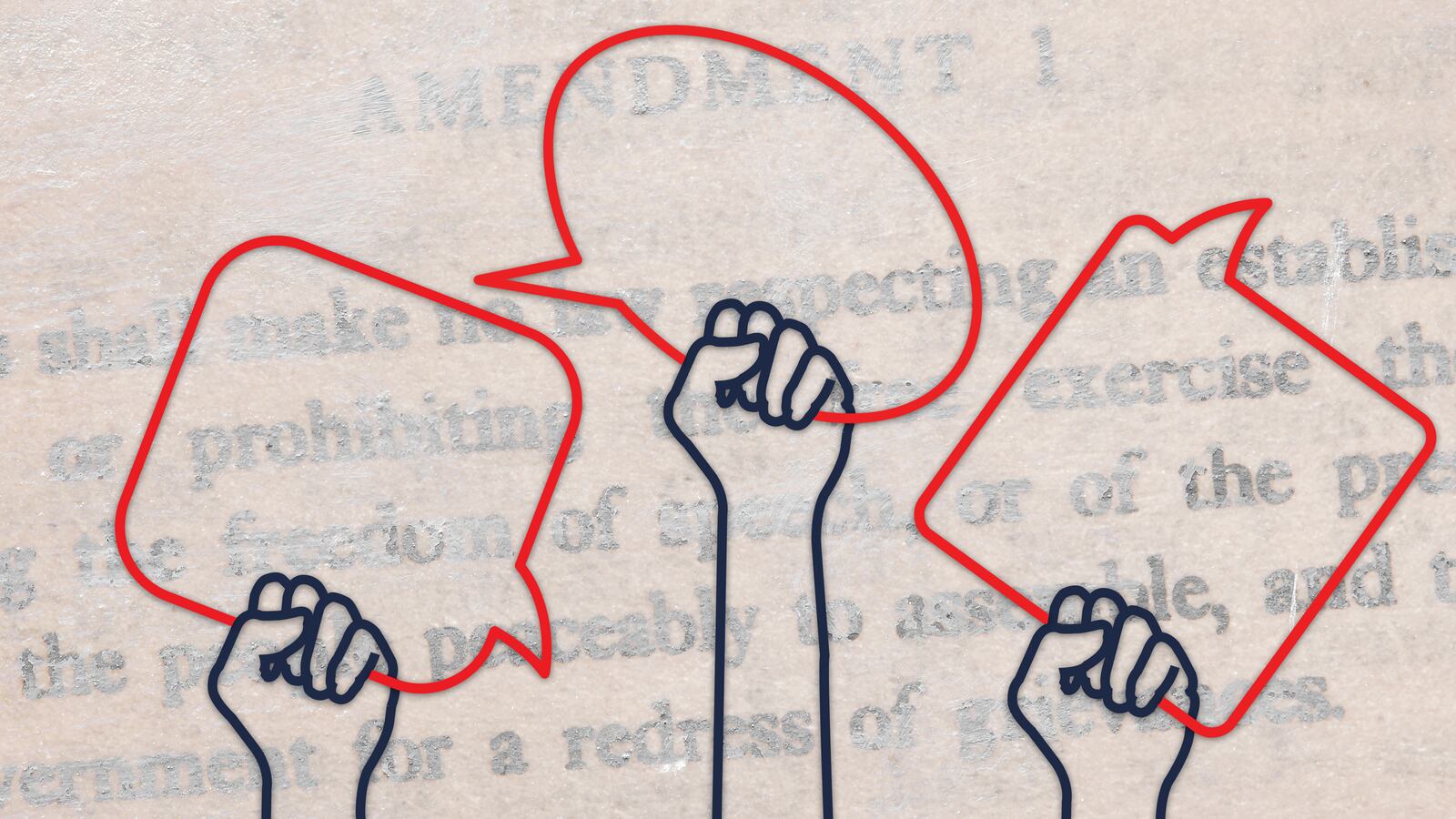Free speech is a left-wing value.
As a matter of self-preservation, any movement arrayed against the most powerful forces in our society needs to care about the right of free expression. And as a matter of principle, it’s not possible to separate the goal of empowering the working class from the necessity of opposing those who think ordinary working-class people are too dumb to be trusted to listen to different points of view and make up their own minds.
As such, I’m always disturbed when I see some of my friends and comrades on the left dismissing concerns about the weakening of free speech norms as merely an unserious preoccupation of elites who just don’t like being criticized.
Our position should be to zealously defend what few free speech protections already exist in a late capitalist society, where most employment is “at-will” and most political speech happens on platforms controlled by a few corporations. And we should pledge to fight like hell to deepen and extend such rights to all the tens of millions of anonymous people who enjoy no meaningful safeguards against being fired or deplatformed for speaking their minds.
When the New York Times’ editorial board recently declared that “America has a free speech problem,” the responses were more interesting than the essay itself. The Times tried to give its discussion a sheen of objectivity by commissioning a poll (with Siena College), but the wording of the questions was sometimes too sloppy for the results to mean much.
Several questions focus on whether people hold their tongues out of “fear of retaliation or harsh criticism”—but there’s a world of difference between the two. I’ve been fired and I’ve been harshly criticized and, of the two, I’ll take harsh criticism every time. You can reasonably hold that the incidents described in Jon Ronson’s book So You’ve Been Publicly Shamed, for example, go far beyond “criticism” and into a troubling form of retaliation—but if this is what the Times/Siena College poll questions meant to refer to, the wording didn’t succeed in making that clear.
The Times’ writers also didn’t clarify whether they were saying that free speech is in worse shape in America now than it’s ever been before, or just that it’s in worse shape now than it was, say, a few years ago. The first claim would clearly be false. The second is a lot more plausible. But the question of whether either is true misses the larger point.
The reality is that whether or not you think there’s a “problem” with something is a question that concerns values and not just facts.
Does America have a lack-of-health-insurance problem? I certainly think so. But someone who wanted to dismiss that could point out that tens of millions more people who were uninsured before Congress passed Obamacare are insured now or, for that matter, that hospitals have been legally prevented since the 1980s from refusing entrance to emergency rooms to patients who are unable to pay. Of course, doctors and hospitals can still deny you life-saving preventative care, and if you return from the hospital alive you can be bankrupted by the bill, but there’s no denying that the situation has improved. The question is whether it’s improved enough.
The same argument could be applied to police brutality. Anyone who knows a little about the history of the civil rights movement, for example, knows that police violence was often far more brazen and openly racist in the relatively recent past. But I wouldn’t tell anyone outraged at how few unjustified police shootings result in successful prosecutions to stop complaining because by historical standards it’s not that much of a problem.
The New York Times editorial mentioned both attempts to shut down controversial speakers on campuses and efforts by Republican state legislatures to ban discussion of controversial ideas in the classroom and explicitly said the latter was worse—but they were still widely criticized for “false equivalence” for even mentioning both the large threats and the small ones at the same time.
A clumsy turn of phrase in the New York Times editorial about a “right” to speak one’s mind without fear of shaming or shunning was widely attacked as a misrepresentation of the legal right to free speech. But the real question is whether we care about the corrosive effect of the widespread use of shunning and shaming tactics when it comes to avoiding debate about controversial issues.
Firing people, deplatforming them on social media, or canceling their lectures on campuses are clear-cut free speech issues. But even slightly more nebulous concerns over shaming and shunning shouldn’t be dismissed quite so easily.
The First Amendment to the U.S. Constitution (and various laws in other countries protecting free speech) are important because they offer a safeguard against one particularly egregious category of threats to the values of open debate and a free flow of information—direct retaliation by the government. But saying that something isn’t a free speech issue because nothing anyone does is violating the First Amendment is like saying that environmentalists protesting corporate pollution must be wrong if the polluters aren’t violating any provisions of the Environmental Protection Act.
I’m not surprised that some mainstream progressives make excuses for attempts to shut down events on college campuses that offend some students or even advocate for corporations to change the rules to make it easier to deplatform social media users.
As Thomas Frank argued in his book Listen, Liberal: Or, What Ever Happened to the Party of the People?, the dominant ideology of the contemporary Democratic Party isn’t left-populism rooted in organized labor, but a kind of technocratic liberalism—within which ideological battles are understood as “problems” best “solved” through the application of technocratic expertise.
This kind of liberalism reinterprets “social justice” not as raising the floor for the working-class majority but as removing every barrier to the best and brightest from each group rising through the ranks to join this class of benevolent experts. Within this framework it makes perfect sense to spend your time worrying that ignorant proles will have their minds warped by “disinformation” or other “dangerous” ideas.
What’s more disturbing is seeing people whose politics basically align with mine echo the culture-war talking points of the technocratic liberals on free speech issues.
I’d beg people who’ve learned to roll their eyes (or make jokes about frozen peaches) when they hear the phrase “free speech” to look into the history of Ida B. Wells’ newspaper The Memphis Free Speech, or the “free speech fights” waged by radical labor unionists in the early 20th century, or the role of the Free Speech Movement at UC-Berkeley in giving birth to the New Left.
If you think American society as it exists is fundamentally flawed and should be transformed in a radically more egalitarian direction, your first instinct should be to push for broader protections of dissent rather than narrower ones. We should be less worried about “bad” ideas being spread within the current limits of mainstream discourse, than about better ones not being heard.
As Noam Chomsky pointed out in an interview with my late friend Michael Brooks (shortly before Chomsky signed the 2020 “Harper’s Letter” on free speech and open debate), people who shrug off attempts to stop speakers from speaking on campuses as “just more speech” should think a little harder about the long history of leftist speakers being stopped from speaking on campuses—to cite just one obvious example, during the McCarthy era and immediately afterward.
There’s also a deep question of principle here. Historically, the left has certainly had its share of hypocrites who claimed to care about empowering the working class, while actually supporting Stalinist regimes that trampled free speech and every other democratic ideal.
But what about the part of the left that’s always been serious about its stated values? If we share in the belief of the great 20th-century Marxist and pan-Africanist writer CLR James that every cook can govern, that egalitarianism should shape how we respond to discussions of free speech.
When The New York Times in 2020 published a genuinely disturbing editorial by Republican Sen. Tom Cotton calling for then-President Donald Trump to send troops to quell post-George Floyd unrest in American cities, the left missed an opportunity. Instead of adding our voices to those of mainstream liberals scolding the “Paper of Record” and pressuring the then-opinion editor to resign, we should have asked why they didn’t publish it side by side with a response by someone like the leftist academic Cornel West. Do we really not believe that West would have been more persuasive than Sen. Cotton?
Was the “Harper’s Letter” signed not just by people like Noam Chomsky, who has a long history of defending the free speech of even his most extreme enemies, but by various figures with a history of hypocrisy on the issue? Instead of using the latter to completely dismiss the concerns expressed in the letter itself, we should have praised the letter’s simple message, and criticized some of its signatories for not living up to its stated principles.
We shouldn’t shrug our shoulders when someone famous is fired or deplatformed. We should seize the opportunity to talk about how much less protection is afforded to the average person against such things happening to them. And we should push to rebuild the labor movement at American workplaces, as well as acting politically to change employment law, so everyone is free to speak their mind.
The results of this won’t always be pretty. Ignorance and bigotry are very real.
But in a world marred by runaway levels of economic inequality and a military-industrial complex that literally threatens the continued existence of human civilization, it’s hard to accept the idea that we should be more worried about too many dissenting ideas being freely expressed or elite actors having too little power to shape the limits of public discourse. Now more than ever, the left needs to fight for free speech.









